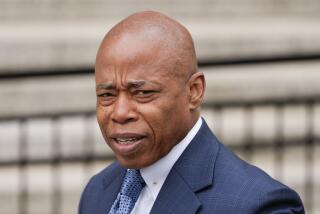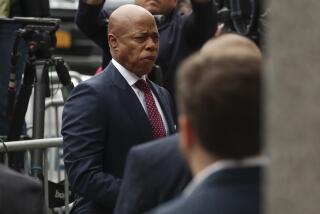Court Move May Ease Cost of Mayor’s Ballot Item Mistake : Elections: A quick ruling on Bradley’s accidental OK of measure would lift need to print two voter pamphlets.
The curious case of Mayor Tom Bradley’s mistaken approval of a citywide ballot measure he had intended to veto was placed on the judicial fast track Thursday in an effort to lessen the financial repercussions of the mayor’s blunder.
Superior Court Judge Ronald M. Sohigian agreed to rule in the apparently unprecedented case next Wednesday--May 1, not May 13, as originally planned. This, it is hoped, will allow the city time after his final decision to ready 1.4 million sample ballots for the June 4 Los Angeles elections.
The move is expected to save taxpayers the additional $520,000 to $700,000 it would cost to print the ballot twice--once with the controversial ordinance, and once without it, said attorney Robert Forgnone, who is representing City Clerk Elias Martinez in the case against Bradley.
Now, according to Forgnone, the city faces only $150,000 in additional costs, the result of printers having to work overtime.
“This, at least, gives us certainty . . . in terms of getting the materials out,” the attorney said.
Meanwhile, the judge ordered both Bradley and his high-ranking aide, Anton Calleia, to appear for depositions as soon as possible to help sort out the tangled legal question of what to do about the mayor’s mistake. Bradley, who is touring the Far East, was ordered to submit to questioning by attorneys immediately upon his return to Los Angeles early next week.
Calleia was to be questioned today--all day, if necessary, the judge said.
“I have to insist that you’ll be working on this case nonstop between now and when we get together for the (May 1) hearing,” the judge warned rival attorneys.
The ballot measure in question is one that would greatly expand the City Council’s authority over large city agencies--such as the Harbor Department and the Department of Airports--that now run with virtual independence under boards appointed by the mayor. When the measure was first proposed and passed by the City Council, Bradley lashed out against it, calling it a “naked power grab.”
Then, inexplicably, the mayor signed its approval.
“It was through an inadvertent error,” Bradley’s press aide, Vallee Bunting, said of the signing March 7, a day when hundreds of items were said to have flowed across the mayor’s desk.
The case became a legal squabble when, five days later, Bradley apparently recognized the error and asked that the measure be kept off the ballot despite his approval. By that time, the measure had been publicized in legal announcements. City Council members exploited the mistake by voting 10 to 2 to place the measure before voters.
Meanwhile, the city attorney’s office issued an opinion saying Bradley had a right to change his mind, while the city clerk moved ahead in drafting a measure for the ballot--setting up an in-house fight at City Hall.
“We’ve never experienced this before,” council President John Ferraro said Thursday. “The mayor signed the ordinance . . . and then he says, ‘Wait a minute, I didn’t mean to sign that; bring it back to me.’ ”
City Councilman Ernani Bernardi, a 30-year veteran on the council, said, “I’ve never seen anything like it. The argument (the mayor’s office) is using is, ‘A lot of papers were put on his desk and he inadvertently signed it. . . . I don’t know if I’d want to admit that.”
The lack of a precedent became an issue in court Thursday as Judge Sohigian questioned attorneys about prior case law. Forgnone, the attorney for the city clerk, conceded that there seemed to be no such prior cases on the legal record.
“In any jurisdiction?” an incredulous Sohigian asked. “Here we have 50 states, and then the federal government . . . heaven knows how many cities. . . . And nothing turned up?”
“Nothing that . . . has a politician reversing his field on the basis of a wrong decision,” Forgnone said.
The case has become complicated by political issues, as well. With the city attorney unable to represent both the mayor and city clerk because of the conflict in interests, the City Council was forced to act on Tuesday to hire an outside lawyer on the city clerk’s behalf. But soon after the council selected Gibson, Dunn & Crutcher, a Los Angeles firm, to represent Martinez, Councilman Bernardi became irritated over another issue and left the council chambers, breaking the quorum, Ferraro said. As a result, the council never got around to approving the $25,000 that the company might be paid.
With Bradley out of town, Ferraro was acting mayor Tuesday and would have been empowered to approve the expenditure. Now, Ferraro said, the action will likely occur next week, when Bradley will be back in Los Angeles and able to veto the money.
More to Read
Sign up for Essential California
The most important California stories and recommendations in your inbox every morning.
You may occasionally receive promotional content from the Los Angeles Times.










